イベント&アクティビティ
Deutschsprachiges Kaffeekränzchen „Philosophie-Jause“
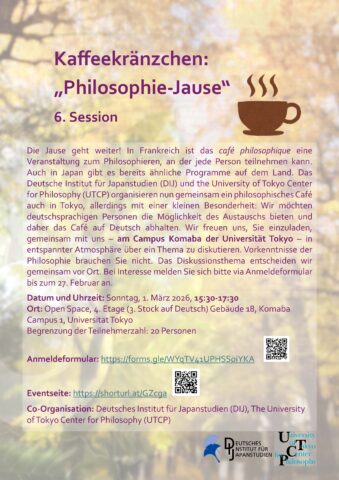 Die Jause geht weiter! In Frankreich ist das café philosophique eine Veranstaltung zum Philosophieren, an der jede Person teilnehmen kann. Auch in Japan gibt es bereits ähnliche Programme auf dem Land. The University of Tokyo Center for Philosophy (UTCP) und das Deutsche Institut für Japanstudien (DIJ) organisieren gemeinsam ein philosophisches Café auch in Tokyo, allerdings mit einer kleinen Besonderheit: Wir möchten deutschsprachigen Personen die Möglichkeit des Austauschs bieten und daher das Café auf Deutsch abhalten. Das Organisationsteam (Yukiko Kuwayama, UTCP und Sebastian Polak-Rottmann, DIJ) freut sich, Sie dieses Mal auf den Campus Komaba der Universität Tokyo einzuladen, um gemeinsam in entspannter Atmosphäre über ein Thema zu diskutieren. Fachliche Vorkenntnisse benötigen Sie nicht. Bei Interesse melden Sie sich bitte bis zum 27. Februar an. Weitere Informationen hier
Die Jause geht weiter! In Frankreich ist das café philosophique eine Veranstaltung zum Philosophieren, an der jede Person teilnehmen kann. Auch in Japan gibt es bereits ähnliche Programme auf dem Land. The University of Tokyo Center for Philosophy (UTCP) und das Deutsche Institut für Japanstudien (DIJ) organisieren gemeinsam ein philosophisches Café auch in Tokyo, allerdings mit einer kleinen Besonderheit: Wir möchten deutschsprachigen Personen die Möglichkeit des Austauschs bieten und daher das Café auf Deutsch abhalten. Das Organisationsteam (Yukiko Kuwayama, UTCP und Sebastian Polak-Rottmann, DIJ) freut sich, Sie dieses Mal auf den Campus Komaba der Universität Tokyo einzuladen, um gemeinsam in entspannter Atmosphäre über ein Thema zu diskutieren. Fachliche Vorkenntnisse benötigen Sie nicht. Bei Interesse melden Sie sich bitte bis zum 27. Februar an. Weitere Informationen hier
DIJ Roundtable on recruitment and training strategies

Japan is a highly attractive, but difficult market for multinational companies. Their presence is by far the lowest among the OECD when measured by the stock of foreign direct investment relative to GDP. One of the biggest hurdles is the recruitment of qualified personnel. What strategies do foreign companies in Japan pursue to address the human resource challenge? To what extent do their strategies incorporate practices applied in their home market? This DIJ Roundtable presents findings from interviews with 25 experts from the field of human resource management in ten German companies in Japan. The presentation by Matthias Pilz will be followed by a panel discussion with Shigeki Egami and Carolina Kawakubo, moderated by Franz Waldenberger, a Q&A session, and a networking reception. Details and registration here
Book chapter by David M. Malitz on political decentralization in Thailand
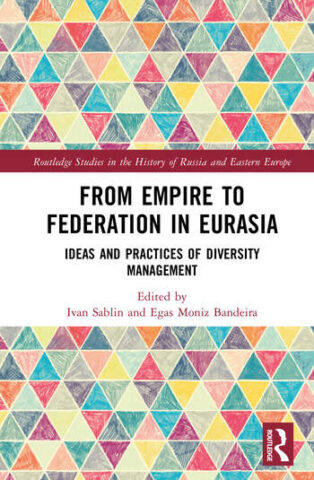
Thailand is a highly centralized unitary state. Provincial governors are appointed by Bangkok’s Ministry of the Interior and local administrations rely heavily on central government transfers. This centralization reflects not only elite interests but also a political culture shaped by the kingdom’s transformation from a loosely integrated multi-ethnic empire into a centralized nation-state, first under European imperial pressure and later during the Cold War. As David M. Malitz shows in “A Kingdom ‘One and Indivisible'”, debates about political decentralization date back to the early twentieth century and resurfaced particularly during the period of democratization in the 1990s as well as after the 2014 military coup. Japan has repeatedly been referenced in these debates and the Japan International Cooperation Agency provided capacity-building programs for local authorities in the 2000s to support decentralization efforts. His chapter is published in From Empire to Federation in Eurasia. Ideas and Practices of Diversity Management (Routledge 2026).
Sebastian Polak-Rottmann zitiert zum Problem leerstehender Häuser
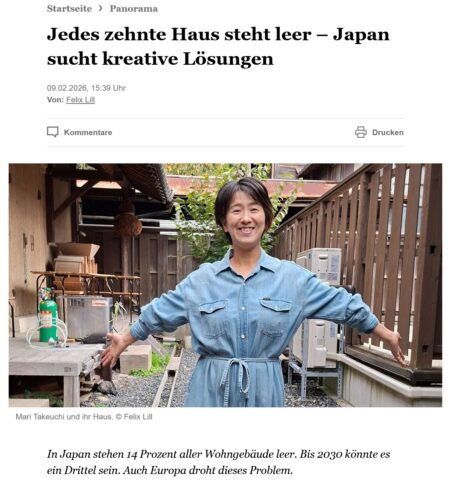
In Japan stehen 14 Prozent aller Wohngebäude leer. Bis 2030 könnte es sogar ein Drittel sein, und auch Europa droht dieses Problem. DIJ-Anthropologe Sebastian Polak-Rottmann erklärt in der Frankfurter Rundschau, warum Japan besonders stark betroffen ist und wie Menschen im ländlichen und städtischen Japan mit dem “akiya mondai” umgehen: „Der wesentliche Punkt ist, dass diese Häuser in der Regel mit der Zeit verfallen. Sie sind ein Symptom von Wanderungsbewegungen, auch von einer gewissen Unattraktivität des ländlichen Raums für viele Leute.“ Seine Expertise zu Auswirkungen des demographischen Wandels auf zwischenmenschliche Verbindungen vor allem im ländlichen Japan wurde auch zitiert in Artikeln in der Augsburger Allgemeinen und den Salzburger Nachrichten.
Book chapter by Dolf Neuhaus explores industrial education in colonial Korea

Vocational and industrial training loomed large in Japanese colonial education in Korea. Between 1910 and 1945, Japanese authorities implemented an education system that concentrated on industrial education for Koreans, who were generally portrayed as possessing a low level of civilization. Geared toward assimilating Koreans as Japanese subjects, this system was characterized by segregation and discrimination with severely restricted access to higher education for Koreans. Comparing the perspectives of missionaries, Korean students, and Japanese colonial authorities, Dolf-Alexander Neuhaus‘ book chapter “Training the Heart, the Head, and the Hand”: Colonial Education, Missionaries, and Industrial Schools in Korea, 1906–1930 examines the YMCA’s pioneering role in industrial education as a site where Protestant work ethics, Korean aspirations for modernization, and colonial policy converged — and sometimes directly conflicted. The chapter is published in The Gospel of Work and Money. Industrial Education and Its Global Legacies, edited by O. Charbonneau and K. V. Walther (University of Pennsylvania Press 2026).
Neues Buchkapitel von David M. Malitz zu Buddhismus und japanisch-siamesische Beziehungen
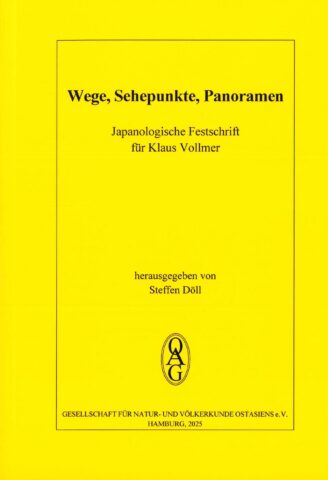
DIJ-Forscher David M. Malitz hat das Kapitel “‘Länder der gleichen Religion’? Der Buddhismus und die japanisch-siamesischen Beziehungen im Zeitalter der absoluten Monarchie Siams” beigetragen zum Sammelband Wege, Sehepunkte, Panoramen. Japanologische Festschrift für Klaus Vollmer (Hg. Steffen Döll, Hamburg: Gesellschaft für Natur- und Völkerkunde Ostasiens). Das Kapitel untersucht die Rolle des Buddhismus in der frühen Phase der modernen japanisch-thailändischen Beziehungen und stützt sich dabei auf Primärquellen aus Japan und Thailand. Der Schwerpunkt liegt auf dem Zeitraum von der Aufnahme formeller diplomatischer Beziehungen im Jahr 1887 bis zur Verfassungsrevolution von 1932. Obwohl der Buddhismus häufig als gemeinsamer kultureller und religiöser Bezugspunkt herangezogen wurde, zeigt das Kapitel, dass auch doktrinäre Unterschiede und divergierende klösterliche Praktiken zwischen den japanischen Mahāyāna-Schulen und dem siamesischen Theravāda-Buddhismus eine entscheidende Rolle spielten, um Fragen der nationalen Identität, der Hierarchie in den Außenbeziehungen, der Modernität und der politischen Legitimität innerhalb der buddhistischen Welt zu verhandeln. Die Festschrift ehrt den seit Sommer emeritierten Japanologen Klaus Vollmer (LMU München).
DIJ co-hosts symposium on animal welfare at Nichibunken

Together with the International Research Center for Japanese Studies in Kyoto (Nichibunken), the DIJ will co-host the international symposium The Current State of Animal Welfare Movement Research (main language: Japanese) on February 14-15. It aims to explore the animal welfare movement in Japan from multiple perspectives, including ethics, history, and society. The term “animal welfare movement” here refers to all social activities aimed at human-animal coexistence, improving animal treatment, protection, and legal recognition. Four researchers from Japan and abroad, including DIJ sociologist Barbara Holthus (“The Sociology of Humans and Pets: Happiness, Loneliness, Multispecies Families”, in Japanese), will give presentations to examine human efforts concerning animal treatment under the umbrella term “animal welfare movement,” re-examining the nature of human-animal relationships. Participation in the symposium is only possible online.
Hybrid Study Group on Haga Yaichi and the Imagination of National Identity
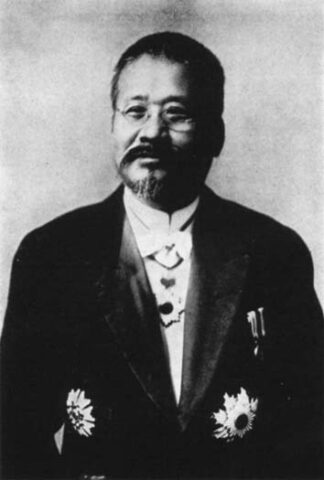
In 1907, amidst the national triumph following the Russo-Japanese War and the domestic unrest symbolised by the Hibiya riots, Haga Yaichi published Kokuminsei jūron [Ten Essays on National Character]. As an heir to the kokugaku tradition, a “father” of Japan’s literary canon, and a transmitter of German philology, Haga identified ten characteristics of the Japanese people in this widely circulated volume. While scholars in the 1970s embraced it as a precursor to nihonjinron, recent scholarship has reinterpreted it primarily as a tool of governmental suppression. This presentation challenges both interpretations through a close reading and contextual analysis. It aims to expand our understanding beyond familiar themes of imperial loyalism or agrarian nostalgia, reframing kokuminsei as a dynamic site of identity production. Details and registration here





 Open Access
Open Access
